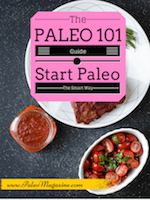The Definitive Guide to Recipes and Copyright
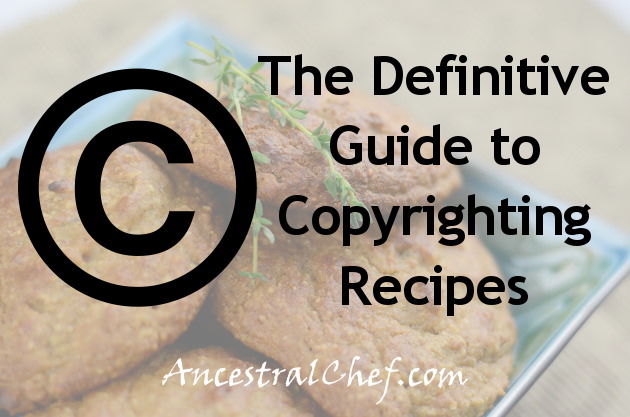
Are you scared that someone will steal your recipes (or perhaps someone already has)?
Or are you scared that you might break the law when you post a recipe you read somewhere else?
There’s a lot of confusion out on the web about what you can take from someone’s recipe and what you can’t take, so here is a definitive guide to finally put this sizzling issue to bed! (The caveat, of course, is that the law constantly changes, so it will never actually be put to bed completely.)
This is the first of several articles that will address different aspects of protecting recipes, blog posts, and culinary discoveries. This particular article addresses whether or not there is actually copyright law protection for recipes (we look at the actual law not just speculations), as well as concrete steps you can take to enforce the rights you do have!
First- surprise, surprise – here’s my legal disclaimer: nothing in this article (or at ) is legal advice, and you should consult your lawyer for any legal advice! (And, also, this is from the perspective of US copyright law.)
This is a length article, so here’s what in store for you (click to jump to that section):
- What is Copyright Law?
- A Brief History of Recipes and Copyright
- Are Recipes Protected by Copyright Law?
- So When is a Recipe Protected By Copyright Law?
- So Should You Copy Everyone’s Recipes and Pretend They’re Your Own? It’s Legal, Right?
- So What Does This Really Mean for Cooks and Bloggers?
- But Ethically, How Should You Use Other People’s Recipes?
- How To Figure Out if Someone Copied Your Recipe
- What Can You Do if Someone Steals Your Photo or Recipe?
- Do You Need a Copyright Symbol on Your Website?
- What if You Want People to Copy Your Work?
- Should Copyright Law Protect Recipes?
Onto the actual juicy stuff, or at least as juicy as law can get…
What is Copyright Law?
It’s helpful to actually understand just a bit about copyright law in general.
Whenever you create something tangible, copyright protection attaches immediately to it. Whether you write a Pulitzer Prize-winning novel or draw a silly doodle on the back of a receipt, you automatically and immediately have copyright protection to that book or doodle.
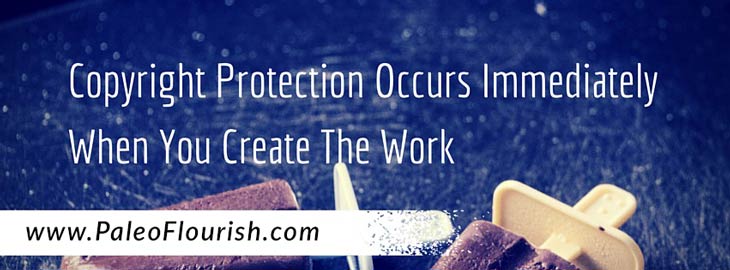
In other words:
- It doesn’t matter if what you produce has value or is “worthwhile.”
- You do NOT have to register your work with the copyright office.
- You do NOT have to put that little copyright symbol by it.
There are times when registering with the copyright office is a good idea (e.g., if you want to file a law suit for infringement of that copyright), and that little copyright symbol might help remind some less-knowledgeable people that they shouldn’t be copying your work, but neither is required.
In general, owning the copyright of something gives you the right to make copies of it – obvious, right? But, it also gives you the right to sell or lease your work, sell or assign these rights, or create derivative works (hence why you don’t see many official adaptations of Harry Potter).
However, not everything is protected by copyright law….
A Brief History of Recipes and Copyright
The early cases in America dealing with recipes suggest that recipes were somewhat copyrightable (e.g. – Belford, Clarke & Co. v. Scribner, 144 U.S. 488 (1892) and Fargo Mercantile Co. v. Brechet & Richter, Co., 295 F.823, 824 (8th Cir. 1924)), but this idea soon changed. In fact, a later case specifically finds that these earlier cases do not support copyright of recipes.
The most established treatise on copyright law is Nimmer on Copyright, and in this treatise, Melville Nimmer wrote what evolved to be the death knoll for recipe copyrightability. Nimmer’s analysis of recipes swayed countless courts in years to come and became the definitive word on the non-copyrightability of recipes.
Of course, that doesn’t mean Nimmer was wrong just because some of the early cases found otherwise – in fact, I think Nimmer was quite correct.
As I’ll explain further below, Nimmer determined that recipes were (1) functional and therefore not original and (2) found to be a procedure or process, which are things that don’t get copyright protection.
Are Recipes Protected by Copyright Law?
In general, No, with exceptions (wow, it’s amazing how law school teaches you how to never give a straight answer!).
The Copyright Act has a whole list of things that are protected by copyright. Recipes are not on the list. Still, the list isn’t exclusive, meaning that things not on the list could be protected.
The general test for copyright protection is originality, and the original and creative portions of the work must be able to be separated from the utilitarian/functional aspects of the work.
For instance, clothing is a very popular example, since clothing is generally not able to be copyrighted at all (Knitwaves, Inc. v. Lollytogs Ltd., 71 F.3d 996, 1002 (2d Cir. 1995)). However, as the Knitwaves case also shows, patterns on clothes may be copyrighted, since they don’t tend to have any actual function. But when it comes to the clothing itself, courts have continually ruled that clothes are functional (i.e., designed to be used rather than displayed like art) and therefore not able to be copyrighted, even if the clothing design is new or unique.
Likewise, courts have generally ruled that recipes are functional and therefore not able to be copyrighted.
The most definitive case on this issue was Publications International, Ltd. v. Meredith Corp. (88 F.3d 473 (7th Cir. 1996)). This case involves the fascinating subject of a book of Dannon yogurt recipes.
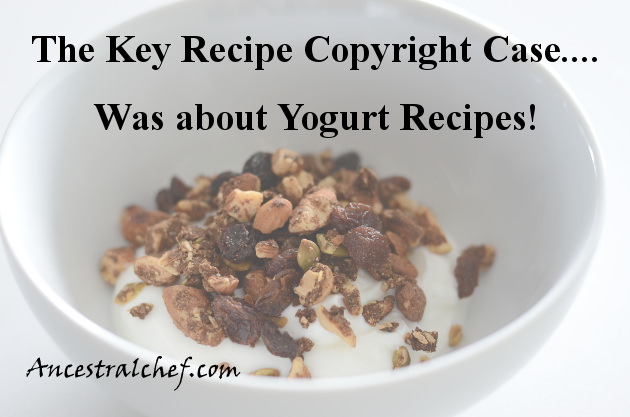
Meredith had in 1988 published a book called “Discover Dannon – 50 Fabulous Recipes With Yogurt.” In the case, Meredith alleged that Publications International, Ltd. (we’ll call them PIL) copied many of the recipes from their Dannon book and printed in them in various publications (some of them copying up to 22 recipes). How similar were the recipes? Well, although not identical, the court (rather humorously for judges) stated: “it doesn’t take Julia Child or Jeff Smith to figure out that the PIL recipes will produce substantially the same final products as many of those described in DISCOVER DANNON.”
So did Meredith win?
No. In fact, the court was pretty harsh about it too, stating that the recipes did not “contain even a bare modicum of the creative expression” that receives copyright protection.
And here’s what the court had to say about the specific parts of a recipe:
“The identification of ingredients necessary for the preparation of each dish is a statement of facts.”
and also:
“[The] recipes’ directions for preparing the assorted dishes fall squarely within the class of subject matter specifically excluded from copyright protection by 17 U.S.C. § 102(b).”
In other words, the court ruled that both the ingredients and the directions were not protected by copyright, because they are a “procedure, process, [or] system,” and copyright does not extend to those things.
Other cases, such as Lambing v Godiva Chocolatier (142 F.3d 343 (6th Cir. 1998)), have ruled in the same way.
So When is a Recipe Protected By Copyright Law?
Currently, the U.S. Register of Copyrights states that:
“Copyright law does not protect recipes that are mere listings of ingredients….. Copyright protection may, however, extend to substantial literary expression—a description, explanation, or illustration, for example—that accompanies a recipe or formula or to a combination of recipes, as in a cookbook.”
Although everyone quotes this statement as if it’s the law, the truth of the matter is that it’s not law (just like Wikipedia isn’t either!). This statement is neither binding nor very clear, but it does make more sense if you put it together with the Dannon Yogurt case I just told you about.
In fact, the court actually stated that they’re not providing us with a general rule explaining whether recipes always are or are not copyrightable, so in certain cases parts of a recipe could be copyrightable if there were “expressive elaboration” within the recipe. In other words, a recipe might be protected under copyright law if there were some “creative narrative,” such as a story of how the recipe came about, suggestions for how to make the final food look better, or even suggestions of wine pairings.
Basically, anything that is more than the list of ingredients and the directions is likely able to be copyrighted to some degree.
So Should You Copy Everyone’s Recipes and Pretend They’re Your Own? It’s Legal, Right?
You can certainly try, if you want to get ousted by the web, cooking, and blogging communities!
Just because something is legal doesn’t mean you should do it. The cooking community has always been based on sharing and caring, which is probably why many chefs think allowing recipes copyright protection wouldn’t really work! After all, how can you say who came up with the apple pie first.
So What Does This Really Mean for Cooks and Bloggers?
As a cook, you can always be safe in the knowledge that you can cook whatever recipe you want without encroaching on anyone’s rights, although that might not be the case if you’re a cook in a restaurant (see below).
As a recipe/cooking blogger, you won’t run afoul of any copyright laws if you copy a recipe from somewhere else, as long as what you copied was no more than the list of ingredients and the bare directions. This makes sense – after all, how many ways of saying “2 teaspoons of salt” or “preheat the oven to 350F” are there?
However, any additional language someone has in the recipe (perhaps explaining what coconut flour is or saying that they love chocolate and so they always add a bit more chocolate chips into the cookie) may be copyrightable. If you’re going to copy a recipe, don’t copy those bits, and add in your own flair.
However, what is most definitely certain, is that you CANNOT copy any photos or illustrations accompanying a recipe! There have been several recent cases of photograph copyright infringement where people have had to settle for several thousand dollars for using ONE photo! I’ll be putting up a post soon about where you can find FREE photos that you can use in your blog posts (or even in your business brochures) without breaking any copyright laws!
But Ethically, How Should You Use Other People’s Recipes?
I can’t really tell you what’s right and wrong, but my answer is attribution, attribution, attribution!
Most chefs generally love to see other people making their recipes, but they hate it when someone else takes credit for those creations! So, if you came up with your recipe after looking at someone else’s recipe, then just give them a shout-out and a link if possible!
The food blog alliance provides this handy guide to some social rules that cooks, writers, and bloggers tend to follow in the recipes sphere:
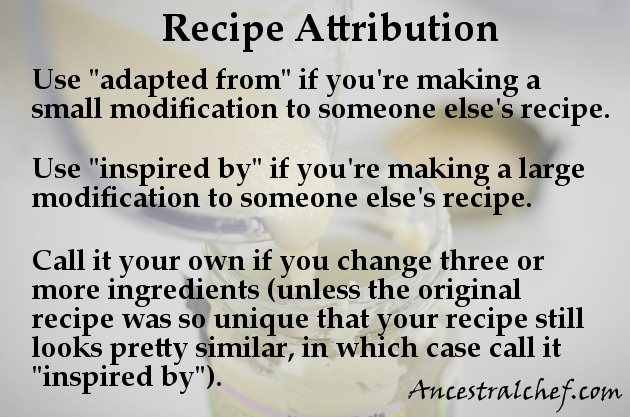
How To Figure Out if Someone Copied Your Recipe
All legality aside, you probably at least want to know if someone is using your recipe.
For the text of the recipe (ingredients and directions), the easiest way is to consult Mr. Google. I find a distinctive phrase from my recipe, place it in quotation marks, and then search for it on Google.
For example, my Paleo Apple Pie recipe contains the phrase “Peel off top parchment paper and carefully flip the rolled dough into the pie pan” (which is probably not that creative of a phrase, but still). The search yields just one result: my recipe!
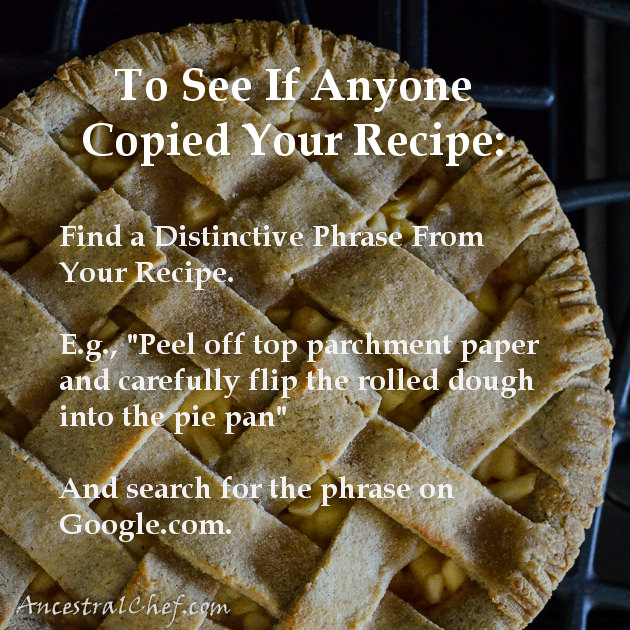
For photos, you can use Google Image search. If you have the image saved on your computer, then you can just drag the actual image into the Google image search box. Alternatively, you can enter the URL of the image into the Google image search box. If you don’t know what the URL of the photo is, you can just go to the image on your website and right click on it. If you’re using Chrome as your browser, click the “copy image URL” option. If you’re using Mozilla FireFox as your browser, click the “copy image location” option. If you’re using Internet Explorer 9 as your browser, click on “properties” and the URL should be next to “Address: (URL).” This will allow Google to search through the Internet to see if anyone else used your photo. It’ll also search similar photos so you can see if someone modified your photo and then posted it.
[Update: I learnt from Helene Dsouza that there are a bunch of other ways to keep track of who may have copied you. Options include: http://copyscape.com (you input your website url and they basically run all the text + html on your site through a search engine), http://copygator.com (works by looking at the content in your RSS feed), http://plagiarismdetect.org. And Toni Dash recommended http://en.mention.net, which I really like using (it’s like google alerts, except it works way better – basically it automatically alerts you whenever your blog name or whatever other name you want to check gets mentioned).]What Can You Do if Someone Steals Your Photo or Recipe?
There are several steps you can possibly take:
- If you think someone is infringing on your copyright (particularly if they’ve stolen one of your images), you could just send them a nice email asking them to take down whatever they’ve stolen (your recipe, photo, etc.). Often, that person didn’t realize that what they were doing was in the wrong, and even if they did, they’ll still often take it down when asked. Even if you use some of the approaches below, this is usually the best first step, since it often resolves the problem without much time, effort, or money.
- You can report the infringement to Google. Google can’t do anything to cause the person to take down the stolen material, but it may result in Google removing the infringing material (and maybe the whole site) from their search results. The process appears to be clearer if there’s an infringing image rather than text.
- You can also send a complaint to the website’s hosting company. This is the company that keeps the website on the air! To check which hosting company it is, you can enter the website URL at www.whoishostingthis.com. This won’t work for some websites, but it works for many. Then you simply Google that hosting company’s name along with the phrase “copyright complaint.” For example, HostGator is one of the most popular hosting companies, and this link takes you to their copyrights complaints page.
- If nothing else works, and you feel strongly that they should take down your work, then you probably need to send them a cease and desist letter (or hire an attorney to write and send one). Here’s a website that offers a sample cease and desist letter to give you an idea of what one would look like. (Note that hiring an attorney to write your letter could cost you a few hundred dollars.)
- Finally, if sending a cease and desist letter doesn’t work, or if they respond saying that they actually have rights to use your works (for whatever reason), then this may blow up into a larger legal dispute that could result in a very large legal bill. It’s definitely a good idea at that point to consult an attorney to discuss what your options are and whether it’s worth pursuing. Finding an attorney will differ a bit depending on where you live, but one good method is to do a Google search for “[NAME OF YOUR STATE] State Bar Association lawyer referral.” For example, the New York State Bar Association runs a great lawyer referral service whereby you can call their hotline and get referred to a lawyer that may be able to help you. You then pay $35 for a 30 minute consultation with the attorney, and there is no obligation afterward to hire the attorney. Of course, it’s also great if you can get a referral to a copyright attorney if you have any friends or relatives that have worked with one.
This Food Blog Alliance post provides some more options for what steps you can take..
Do You Need a Copyright Symbol on Your Website?
I see the © symbol on a lot of websites, but under US law, this is not needed.
Like I wrote at the beginning of this rather lengthy article, you get copyright protection as soon as your write or draw or create something original. You don’t have to register it at the Library of Congress, and you don’t have to print a copyright notice or even this © copyright symbol. (Even Wikipedia backs me up on this issue!)
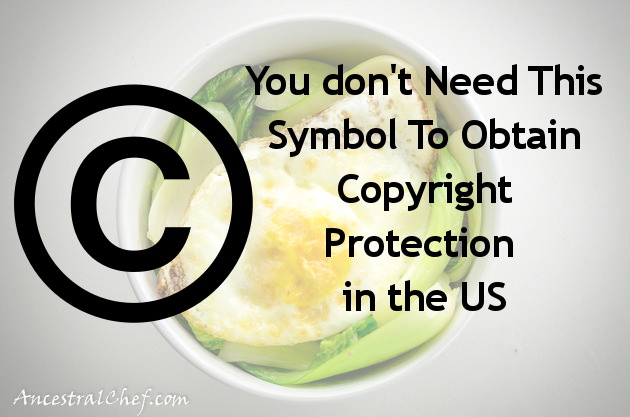
So why do people still use it on their websites and in print? It’s really a vestige of the olden days when it was required for copyright to attach, but it’s been decades since you’ve needed it in the US or in various other countries that have signed the Berne Convention for the Protection of Literary and Artistic Works. Having said all that, there is one possible reason to still use the ©, and that is to remind others that they shouldn’t copy what you’ve created.
What if You Want People to Copy Your Work?
There are actually some reasons for wanting people to copy your work.
If this is the case, then one way of making your work freely available for anyone to copy or to derive other creations out of it is to choose one of the creative commons licenses to license it.
These licenses will differ depending on whether you will allow others to modify your work or whether your work can be used commercially by someone else. A common example of where you might have encountered this is on Flickr. Many people who upload their photos to Flickr choose to attach a creative commons license to it, and in fact, you can use the advanced search function on Flickr to search only those photos that have creative commons licenses attached to them (more on this in an upcoming post)!
Should Copyright Law Protect Recipes?
This has been debated for years. Personally, I think the law is right on this one – it’s simply too hard to say who came up with what.
But what do you think about this issue? Have you had to deal with other people stealing your work? Let me know in the comments!

